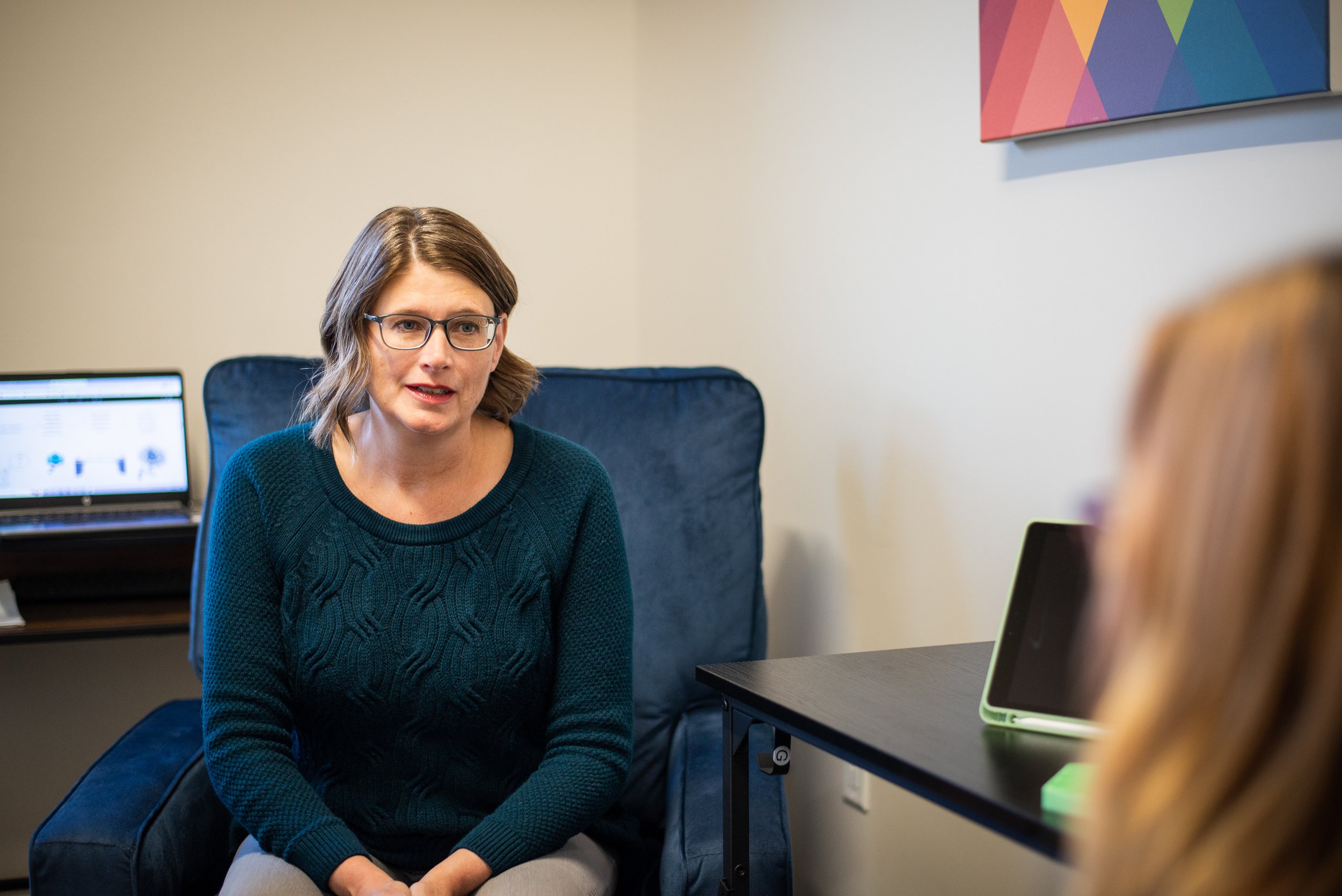
ONLINE AND IN-PERSON COUNSELING IN PEORIA AND THROUGHOUT ILLINOIS
OCD Therapy
You can resolve your doubt, restore your trust, and regain control.

OCD. AKA “the doubting disorder.”
Life with OCD is a life full of obsessional doubts. They might sound like:
“What if I didn’t lock the door?”
“What if I did something hurtful?”
“What if I could hurt a child?”
“What if there are germs on my hands?”
“What if I can’t stop noticing my breathing?”
“What if I don’t love my partner?”
“What if I commit a horrible sin?”
You care deeply about your values, morals, and people your love. You have high standards for yourself, and you’ll do whatever it takes to protect what is most important.
But those “whatever it takes” (compulsions) have taken over your life and somehow actually done the opposite of protecting what’s most important; they’ve drawn you away from it.
What if you could resolve the doubt?
OCD Themes
I want you to know that regardless of what themes show up in your OCD—I can help.
From a treatment perspective, the theme does not matter. OCD is OCD.
Common Themes: Contamination, Harm, Postpartum, Pedophilia, Unacceptable/Taboo thoughts, Relationship, Sexual Orientation, Somatic, Staring, Just Right, Perfectionism, Existential, Religious Scrupulosity, Moral Scrupulosity, Responsibility, Real Event or False Memory
No matter what your OCD theme may be, you are not alone. I will meet you wherever you are with compassion, expertise, and support. Remember, you are not your OCD.
Feared Possible Self
Beyond OCD Themes…
Through I-CBT we learn that all OCD stems from something you are doubting about yourself, the kind of person you fear you might be or could become.
We call this the the “Feared Possible Self.” (Spoiler alert- Your Feared Possible Self is the opposite of who you really are.)
Common Feared Possible Self Themes: I could be someone who is-
negligent, deviant, careless, perverse, selfish, causing harm, easily fooled, clueless, violent, greedy, corrupt, unloving, fraudulent, deceptive
Knowing your Feared Possible Self shines light on where all situational doubts come from. It explains why OCD can often “change themes” and leave you feeling like you are playing whack-a-mole. Ultimately, we can work to resolve your doubt about who you really are, so you can trust yourself again.
This can literally resolve OCD!
A personalized approach to OCD therapy
1. Listen to your story & set goals
With any kind of therapy, one of the most important factors influencing how effective it will be is the quality of the relationship you have with your therapist. I view our work together as an alliance: one where you and I are working together to help you find and follow your own way.
That means we’ll spend time getting to know one another, discussing your history with OCD and any past treatment, and defining what it is that you want to get out of therapy. We will talk directly about these things from the start, and I will create a safe space for you to give me the feedback I need to tailor your treatment to you.
2. Decide on the right approach
I don’t believe there is one “right” way to treat OCD, which is why I’ve chosen to be trained in multiple different approaches. The two with the strongest evidence base are Exposure and Response Prevention (ERP) and Inference-Based CBT (I-CBT). Each one has the potential to be life-changing and effective—it depends on what’s best for you. Additionally, sometimes we integrate supportive approaches, such as Rumination-Focused ERP (R-ERP), Acceptance and Commitment Therapy (ACT), Metacognitive Therapy, Unified Protocol (UP), Motivational Interviewing, and Feedback Informed Treatment (FIT).
I also recognize and support how your identity, values, and overlapping neurobiology or other mental health conditions impact your OCD. I enjoy working with Autistic folks with OCD and understand that while Autism is not something that needs changed or treated, it is something that can comingle with OCD. We want a nuanced approach of figuring out what rituals are supportive to your nervous system and which are compulsions maintaining fear and doubt. I also enjoy helping folks who have co-occurring trauma, anxiety, and/or ADHD. These can call for a multifaceted and nuanced approach.
We will take what you know about yourself, your strengths and struggles, your past experiences and preferences and what I know about OCD and the treatments that help to decide together what approach will be most likely to help you.
3. Monitor progress & make adjustments
Each week, we’ll use evidence-based measures (as well as your individual experiences) to monitor your progress. If what we are doing is working, you should start to feel better pretty quickly, and we’ll know we’re on the right track. If you’re not improving within a few sessions, we can decide whether to make adjustments to what we’re doing based on what we’ve learned.
4. Thrive
We’ll work together in weekly sessions until you are much less impacted by OCD and much more in control and getting back to your real self. Then we will decrease how frequently we meet until you are confident in maintaining your progress and no longer need therapy.
Going beyond ERP
Exposure & Response Prevention (ERP) is a powerful method for treating OCD that involves intentional exposure to obsessive doubts or the things that trigger them, while stopping the compulsions that continue to feed the fears. However, studies have shown that up to 40% of people continue to struggle with OCD even after ERP treatment (and countless more may choose not to even try it due to fear or anxiety of engaging in the exposure exercises).
I believe you deserve to know all of your options.
If ERP is right for you, excellent! I’m highly trained in the method and we’ll put it to work for you. If it’s not, then we’ll take the time to explore what path is best suited to you, your preferences, your history, and your goals.
How I can help:
ERP for OCD
Intentionally facing your fears while preventing compulsions to break the cycle that maintains OCD.
Adjunct Therapies
Acceptance and Commitment Therapy, Rumination Focused ERP, and Metacognitive Therapy for additional support with OCD when needed.
I-CBT for OCD
Learn how obsessive doubts are created to learn there was nothing to fear to begin with.
OCD Overlaps
When OCD overlaps with Autism, ADHD, sensory sensitivities, generalized anxiety, and/or trauma, we use a very individualized and nuanced approach.
I can help.
I can help you learn to stay in the reality of the here and now instead of getting sucked into the scary story your OCD is tricking you into believing.
You can become less afraid of the thoughts. You can learn HOW those doubts were created. You can stop doing the things that are maintaining the OCD. You can break the cycle. You can resolve your doubt and learn how to trust your self again.
You become empowered to make your own choices based on what’s truly important to you, and get back to living your life and choosing to do things that connect you with what you value and love.


